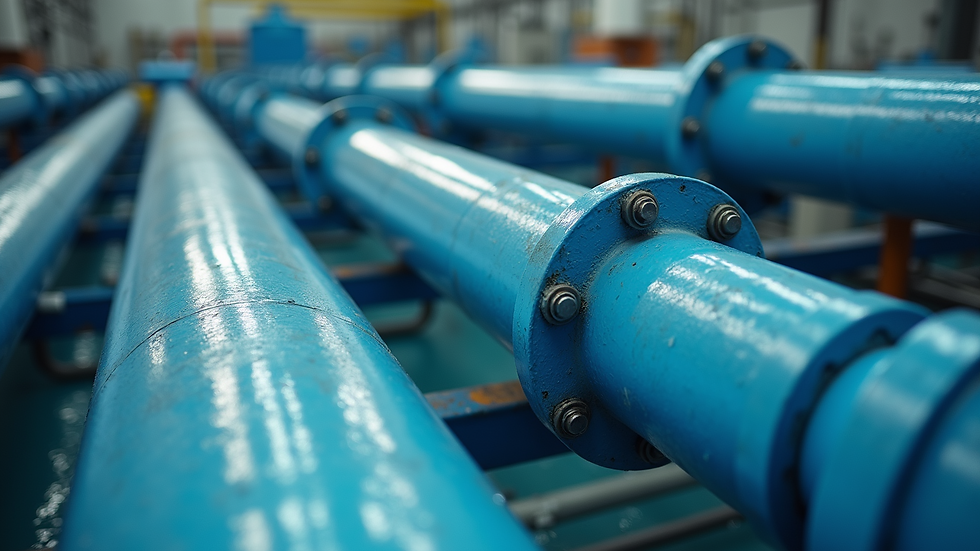Efficient Solutions for Industrial Water Treatment
- palwinder kaur
- Sep 15, 2025
- 4 min read
Industrial water treatment is a critical process that ensures the safe and sustainable use of water in various manufacturing and production sectors. With increasing environmental regulations and the need for resource conservation, industries are adopting efficient water treatment solutions to manage their water usage and waste. This article explores practical and effective methods for treating water in industrial settings, helping businesses reduce their environmental footprint and comply with legal standards.
Understanding Industrial Water Treatment Processes
Industrial water treatment involves several stages designed to remove contaminants and make water suitable for reuse or safe discharge. The process typically includes:
Pre-treatment: Removal of large solids and debris through screening and sedimentation.
Primary treatment: Settling of suspended solids and reduction of organic matter.
Secondary treatment: Biological processes to degrade dissolved organic pollutants.
Tertiary treatment: Advanced filtration and chemical treatment to remove remaining contaminants.
Each stage is tailored to the specific needs of the industry and the quality of the incoming water. For example, textile industries may require different treatment chemicals compared to food processing plants. Efficient treatment not only protects the environment but also reduces operational costs by enabling water recycling.
Practical Example: Textile Industry Water Treatment
In textile manufacturing, water is used extensively for dyeing and washing fabrics. The wastewater contains dyes, chemicals, and suspended solids. A common solution involves:
Coagulation and flocculation to aggregate fine particles.
Activated sludge process for biological degradation.
Membrane filtration to remove residual dyes and chemicals.
This multi-step approach ensures that treated water meets discharge standards or can be reused within the plant, significantly reducing freshwater consumption.

Key Technologies in Industrial Water Treatment
Several technologies have proven effective in treating industrial water efficiently. These include:
Membrane Filtration: Techniques like ultrafiltration, nanofiltration, and reverse osmosis remove suspended solids, bacteria, and dissolved salts.
Chemical Treatment: Use of coagulants, flocculants, and disinfectants to remove contaminants and pathogens.
Biological Treatment: Utilizes microorganisms to break down organic pollutants in wastewater.
Advanced Oxidation Processes (AOPs): Employs oxidizing agents like ozone or hydrogen peroxide to degrade complex organic compounds.
Choosing the right technology depends on the type of contaminants, volume of water, and regulatory requirements. Combining multiple technologies often yields the best results.
Benefits of Membrane Filtration
Membrane filtration is gaining popularity due to its high efficiency and ability to produce high-quality treated water. It is especially useful in industries where water purity is critical, such as pharmaceuticals and electronics manufacturing. Membranes can be customized to target specific contaminants, making them versatile and cost-effective.

What are the components of industrial wastewater?
Industrial wastewater varies widely depending on the industry but generally contains a mix of physical, chemical, and biological contaminants. Common components include:
Suspended solids: Particles like sand, silt, and organic matter.
Dissolved solids: Salts, heavy metals, and minerals.
Organic compounds: Oils, greases, and solvents.
Pathogens: Bacteria and viruses from biological waste.
Toxic chemicals: Pesticides, dyes, and heavy metals.
Understanding these components is essential for designing an effective treatment system. For instance, heavy metals require chemical precipitation or ion exchange, while organic compounds may need biological treatment or advanced oxidation.
Example: Components in Chemical Manufacturing Wastewater
Chemical plants often discharge wastewater containing hazardous substances such as acids, alkalis, and solvents. Treatment involves neutralization to balance pH, followed by chemical precipitation to remove metals, and biological treatment to degrade organic pollutants. Proper handling of these components prevents environmental contamination and health risks.

Best Practices for Implementing Industrial Water Treatment
To maximize efficiency and sustainability, industries should follow these best practices:
Conduct a thorough water audit: Identify water sources, usage patterns, and wastewater characteristics.
Select appropriate treatment technologies: Based on contaminant types and regulatory standards.
Implement water recycling and reuse: Reduce freshwater intake by treating and reusing water within the facility.
Regular maintenance and monitoring: Ensure treatment systems operate optimally and comply with discharge limits.
Train staff: Educate employees on water conservation and treatment procedures.
Adopting these practices not only improves environmental compliance but also enhances operational efficiency and reduces costs.
Actionable Recommendation: Water Recycling in Food Processing
Food processing plants can implement closed-loop water systems where treated water is reused for cleaning and cooling. This reduces water consumption and wastewater generation. Installing sensors and automated controls helps monitor water quality and optimize treatment processes.
Future Trends in Industrial Water Treatment
The future of industrial water treatment is shaped by innovation and sustainability goals. Emerging trends include:
Smart water management: Integration of IoT and AI for real-time monitoring and predictive maintenance.
Green treatment technologies: Use of natural processes and biodegradable chemicals.
Energy-efficient systems: Technologies that reduce energy consumption during treatment.
Circular water economy: Emphasizing water reuse and resource recovery from wastewater.
Industries adopting these trends will be better positioned to meet stricter environmental regulations and reduce their ecological impact.
Example: IoT in Water Treatment Plants
Smart sensors installed in treatment plants can detect changes in water quality instantly. Data analytics help predict equipment failures and optimize chemical dosing, reducing waste and operational costs.
Efficient industrial water treatment is essential for sustainable industrial growth. By understanding the components of wastewater, selecting the right technologies, and following best practices, industries can protect the environment and improve their bottom line. For more detailed information on managing industrial wastewater, exploring specialized solutions can provide tailored benefits for your specific needs.



Comments